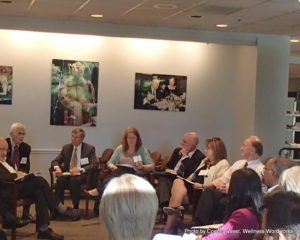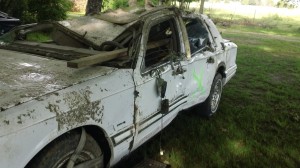Authors note: Two friends had this dialogue about the mental health first aid program and gave me permission to reproduce their experiences.
Positive review of Mental Health First Aid:
Brooke Leonard: [Helping someone with problems that look like mental health concerns] sounds like a really big task but I believe that if it is broken down into smaller chunks and just address one step at a time, the entire subject will be easier to address. For instance, the place where someone exhibits “distress” for the first time might be the family unit.

Unfortunately most families are not trained to recognize or respond to mental “distress.” It is generally looked upon as a phase, hormones, bad behavior, behavior to get attention, etc. I am sure you have heard these things before. So where do they turn for help? Even if they want help. What resources are available to families? Will they seek that help?
To respond to mental health issues from a grassroots level, the state of Missouri is promoting education to aid non-mental health professionals (teachers, parents, youth workers, etc) in recognizing and supporting people exhibiting “distress.” This educational course is offered through the organization “Mental Health First Aid.”
Neutral Review of Mental Health First Aid:
Edward Duff: Mental Health First Aid is pretty good if you ignore the labeling system and just pay attention to the very gentle form of peer support, harm-reduction, and listening they advocate. This is a big IF since the main response of the program is to lead people into psychiatric services. It’s also a form of response short of an emergency hospitalization/capture scenario. This can be a very good thing to avoid, for sure. I liked most of it.
I live in Joplin, MO, which had as many as 158 to 160 people were killed by the tornado and around 1,000 injured. It was the deadliest tornado in America since 1947. I took the course with a herd of social worker do-gooder types doing storm/catastrophe response stuff for Ozark Center and Catholic Charities. Some of the stuff they talk about is fairly non-toxic, like cognitive behavioral therapy and of course the family and peer support stuff. The Australian accents in the videos were amusing and a nice respite from the cowboy/hillbilly stuff I usually have to listen to around here. But they do also refer people into The System, which may or may not be for their own good.

Brooke Leonard: Some of the trainings are free of charge. Contact your local Mental Health Center or Mental Health First Aid directly to find out more info. I took this course over the summer. It was very informational and I feel better prepared for effectively addressing situations where I may encounter someone experiencing “distress” or mental health issues.
Corinna West: I wasn’t sure how to judge mental health first aid. I kept asking friends taking the course but it’s hard to get a good assessment if they don’t understand the risks of labels and medication. People need to understand that in order to hear how sometimes things that are intended to help can actually harm.
A quick explanation of the difference between ‘disease model,” and “distress model” is the idea that folks with a disease are genetically/chemically different or whether everyone can experience extreme states given some rather difficult inputs. Are our problems biological ( a susceptibility) or just a human response that could happen to anyone? If someone has a temporary problem, telling them it’s permanent can all have kind of negative repercussions.
Negative Review of Mental Health First Aid:
This is Dan Fisher’s testimony about Emotional CPR at the Carter Center Symposium on Social Inclusion. This less label intensive model is found at http://www.emotional-cpr.org/















Hi All
As an Australian, living on the outskirts of Melbourne (Victoria) 30km from the 7 Feb 2009 Black Saturday bushfires, the awareness of the devastating fire storms is upmost. I wasn’t directly affected but know people who lost multiple friends, family, some from thone family.
Three years on there is still mental health support being given in primary and secondary schools, as well as generally in the affected communities.
The experiences of trees (eucalyptus) literally exploding like bombs, fire-fronts traveling up to 100km/hr seperating families with no warnings and just not knowing who is safe, the psychological affects are just as devastating.
After every major natural disaster we seem to have Royal Commissions (inquiries) to investigate how things could be done better – emergence response, essential services, health/safety, warnings and community response. The mental health and wellbeing of individuals is directly related to all these factors.
I found this link, hope it’s beneficial to your thoughts:
http://www.redcross.org.au/files/Lessons_Learned_by_Community_Recovery_Committees_of_the_2009_Victorian_Bushfires_v1.0.pdf
Report comment
ps. It’s you guys who have the amusing accents 😉
Report comment
Thank you so much for this report. What a resource for the whole experience of mass disaster recovery. There is great strength and resilience in communities – we seldom look for ways to let it show up.
I hope things are getting better for you.
BTW it’s Thanksgiving Day here in the land of funny accents.
Thanks.
–pk—
Report comment
As a fellow Victorian I am well aware of the effects of the black saturday bush fire and did have friends directly affected. The work being done by them and that continues to go on is brilliant.
BUT that work is not supported by those who support or promote mental health first aid. Mental Health first aid is the most shameful thing that was ever invented and I am ashamed to see it now being directed to the rest of the world.
PLEASE do not confuse disaster recovery with Mental Health Fist Aid. They are two totally different things. One we do well the other is something to be incredibly ashamed off.
Report comment
Corrina,
A great post.
Again.
Accents?
I’m a Texan, who sounds like a Texan.
What can I say?
Happy Thanksgiving!
Duane
Report comment
Thanks for outlining what’s in the MHFA program.
We need to simplify popular education on these topics. If you’re not a clinician, diagnosis is beside the point, but people do need vocabulary that helps them access more information and talk to doctors. I’ve done this sort of work for years. It takes a couple of hours for me to cover the basics, and get as far as suicide prevention. People need to know how to be supportive, and how to connect people with treatment when they need it, and when to call 911.
As for stigma, that’s in the air. The audience shows up ready to listen. It is much more important to help learners connect with the experience in human terms, and know what to do to head off trouble, and have some way to create a path for moving forward.
For me, the biggest drawback to Mental Health First Aid is the cost of certification. I looked at getting trained as a Mental Health First Aid presenter, but the cost was prohibitive. They’ve done a good job packaging the concept and developing the brand. I’ve read about Emotional CPR – it’s another well-branded concept. I do worry about concepts that are explicitly “alternative” because that label is self-marginalizing.
I think we need to get to the raw center of all this in our educational efforts. Everyone’s work can simply aim to promote good health, keep families together, support normal living, and help with safety. There are so many layers to these experiences, and people so diverse, there’s a way for everyone to make contact, pitch in and help out.
Report comment
First Aid is supposed to be about keeping someone alive, until medical help arrives. Hence the argument that Mental Health First Aid can do the same. Problem is it does no such thing.
The BIGGEST success of the program is that over 50% of people who attend the course, go to a doctor and get a prescription for drugs themsevles, usually for anxiety or depression that they did not know they have!!! How that can be seen as something good is beyond me. How that is “first aid” is beyond me.
The ONLY thing the course does is to teach people how to diagnose these conditions, which has nothing to do with a lay person, and that we have these fantastic medications that are more effective than insulin for diabetes to treat them. Medication, medication, medication is the push.
The ONLY thing that could be slightly first aid related is saying that in an acute crisis, you should call emergency services!! They specificaly state that if you see someone about to jump of a building you should call emergency services, which in the US is 911. If a person needs to go to a 20 hour course to learn that something is wrong with them!!
What do people REALLY need to know. How do I respond to someone who is acutely psychotic, acutely suicidal, etc. Yes the person has called emergency services, as they are out of there depth and cannot cope, but what do they do in the meantime. If a person is unconcious you do not just call emergency services, you check for breathing and do CPR if needed. If a person is bleeding profusly you put pressure on the wound. This course does not teach a person what to do in such a situation. At most it says to try and stay calm. Again, nothing more than common sense. If you need to tell someone that they should call emergency services or try not to aggravate someone who is acutely unwell then you really do need psychiatric treatment.
First Aid courses generally do not teach you how to diagnose heart disease, diabetes, or the like. What you are taught to do is to keep someone stable and until professional help arrives.
IF this course is truly about being first aid, then it would acknowledge that lay persons do not need to know how to diagnose and treat conditions, that all they need to know is how to keep someone safe and calm until professional help arrives.
BUT of course since the so called professionals treating these fictional brain diseases cannot keep calm themselves, and since the only thing they are interested in is diagnosing the whole population so they can drug everyone, then they are not doing anything first aid related.
A more accurate label for this course would be basic mental health education. It is nothing more than that. It is education about a disease based model of mental health. There is nothing first aid about it.
As an Australian it does not suprise me that Australians invented it. We are at the forefront of early and pre-emptive diagnosis. We now have compulsory mental heatlh checks for all 3 year olds, by general nurses and GP’s. And we are setting up psychosis risk syndrome clinics all across the countries, at massive costs to the taxpayer. Because we seriously believe that you can predict who will develop psychosis. Even the American Psychiatric Association has rejected it, saying it is simply not possible at present. But apparently Australia is going to prove them wrong.
Australia’s mental health system is something to be ashamed of and mental health first aid is one example of that. One can only hope that the rest of our system is not picked up by the US, and elsewhere.
Report comment